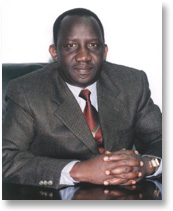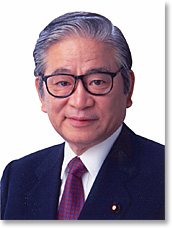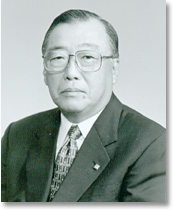In Celebration of Ethiopian National Day, May 28th 2005 – Japan Times
- Dr. Koang Tutlam Dung, Ambassador.
- H.E. Dr. Shozaburo Jimi
President of the Japan-Ethiopia Parliamentary Friendship League - Dr.Sadao Umeda, President The Ethiopian Association Japan
- UNESCO registered Ethiopia’s heritages
- Ethiopia in brief
Dr. Koang Tutlam Dung Ambassador
Democracy and peace taking root in Ethiopia

By H.E. Dr. Koang Tutlam
Dung, Ambassador.
Remarkable, however, is the political development Ethiopia has undergone in the past 12 months, prompting locals and foreigners alike to conclude that democracy has come to stay. Successes in this area are the result of efforts made by the people and the government.
On this occasion, I wish to express on behalf of the government and the people of the Federal Democratic Republic of Ethiopia our heartfelt greetings and best wishes to the Emperor and Empress, the entire Imperial family, the government and the people of Japan. Ethiopia is very grateful for the support it has been receiving.
I wish to also convey my best wishes and regards to Ethiopian compatriots residing in and around Japan.
The 2004/2005 fiscal year, ending in June, has been as eventful time for Ethiopia. The country’s economy grew 11 percent, resulting in booming trade and investment. Attracted by the prospects, many foreign investors from Europe, the Middle East, Asia and North America have started investments in the country. An increasing number of Ethiopian expatriates, too, have returned to invest.
Undoubtedly, however, the main event of the fiscal year has been the success of the third national democratic election. Since the overthrow of the dictatorship led by Colonel Mengistu Hailemariam, Ethiopia had conducted three general elections. But this year’s was unprecedented in public participation and transparency.
More than at any other time, there were open debates among the contesting parties. Both the ruling and the opposition parties had equal access to the government media, and the public was well informed about the parties’ policies. More than 90 percent of the registered 26 million voters went to the polls.
Moreover, the election was the first monitored by foreign observers, Observers from the African Union, European Union, the Arab League and Carter Center monitored the polls through out the country. Former U.S. President Jimmy Carter, who had sent 50 elections monitors through his Carter Centre, said Ethiopia’s poll laid a cornerstone for democratic culture. Other foreign observers shared this opinion: Except for some minor shortcoming, the election was generally peaceful, fair and transparent.
Though official results are yet to be declared, the smooth conduct of the campaigns and the actual voting are clear indications that democracy in Ethiopia has come of age.
The support Ethiopia has been getting from foreign friends and governments was very crucial to this success. Japanese Official Development Assistance has played a significant role in strengthening our infrastructures, food security and health. We also appreciate Japan’s effort to advocate Africa’s development through the Tokyo International Conference on African Development (TICAD) and hope the recent announcement by Prime Minister Junichiro Koizumi to double ODA to Africa in three years brings more benefits to our development endeavors.

 Japan and Ethiopia’s relations are highlighted this year by the World Exposition in Aichi Prefecture: Ethiopia’s exhibit centres on the 3.5 million-year-old humanoid remains known as Lucy discovered in 1974. Apart from Lucy, Ethiopia is showcasing its potential in order to attract more Japanese tourists and investors, as well as boost bilateral trade.
Japan and Ethiopia’s relations are highlighted this year by the World Exposition in Aichi Prefecture: Ethiopia’s exhibit centres on the 3.5 million-year-old humanoid remains known as Lucy discovered in 1974. Apart from Lucy, Ethiopia is showcasing its potential in order to attract more Japanese tourists and investors, as well as boost bilateral trade.
As part the expo, Ethiopia’s National Day was celebrated May 16 at the Expo Hall. Several hundred residents of Horai Town, including more than 100 elementary school students waving flags of Ethiopia and Japan, made the occasion colorful. Performances by the Ethiopian Cultural Troupe and the Horai Taiko drumming group were additional attractions.
Ethiopia’s relations with Japan precedes any among the countries of sub-Saharan Africa. The first contact occurred in 1923, when all but Ethiopia and Liberia were under European colonialism. By the 1930s, relations had developed into formal diplomatic ties. Following the interruption during the Italian occupation of Ethiopia, from 1935 to 1940, formal relations were resumed in 1955.
Bilateral relations have been moving forward in the last 50 years. Prime Minister Meles Zenawi has visited Japan three times since 1993, and Foreign Minister Seyoum Mesfin, two times since 1991. On the Japanese side, recent visits have been made by former Foreign Minister Yoriko Kawaguchi, Parliamentary Secretary for Foreign Affairs Katsuyuki Kawai and a parliamentary delegation led by Dr. Shozaburo Jimi.
Ethiopia is a priority of Japan’s economic development cooperation. Several projects funded by Japanese assistance are under implementation and others are being considered for funding. Ethiopia considers Japan an important development partner.
Throughout 3,000 years of its history, Ethiopia knew very little or no democracy. But since the ouster of the military dictatorship, the country has been changing for the better, improving ties with countries like Japan and, in turn, improving the economic infrastructure at home. In the last 10 years, more schools have been built than at any other time, and education has gone up from 22 percent to 64,4 percent. There are eight universities now compared to two in 1991. Road construction is a priority of the government, taking about 40 percent of the budget.
All these achievements make this May 28 a day to be celebrated with fanfare.
H.E. Dr. Shozaburo Jimi President of the Japan-Ethiopia Parliamentary Friendship League

H.E. Dr. Shozaburo Jimi
President of the Japan-Ethiopia Parliamentary Friendship League
Last September, I paid my third visit to Ethiopia and had very fruitful talks with President Gilma Woldegiorgis, Prime Minister Meles Zenawi as well as notable members of the Ethiopian Parliament. We reaffirmed that the bilateral relations between Ethiopia and Japan were growing steadily and we could see the commitment of both sides to further develop the relations.
The year 2005 marks the 50th anniversary of the restoration of the diplomatic relations between the Ethiopia and Japan. Various events will take place in both Ethiopia and Japan to celebrate the 50 years anniversary. I had a privilege to visit Nagoya on the occasion of the Ethiopian National Day in the 2005 World Exposition, and I am pleased that the National Day was celebrated colorfully with the participation of a great number of people.
As President of the Japan-Ethiopia Parliamentary Friendship League and as Vice President of the Japan-African Union (AU) Parliamentary Friendship League, I sincerely hope that the friendship and cooperation between Ethiopia and Japan will be further developed and I am committed to make every effort to that end.
Dr. Sadao Umeda President, The Ethiopian Association of Japan

Dr. Sadao Umeda
President, The Ethiopian Association of Japan
Since 1971, our association has promoted friendship and goodwill activities between Japan and Ethiopia through creating economic and cultural ties. Among other things, the association has been engaged in providing scholarships to students studying in universities in Ethiopia, donating Ethiopian manufactured chairs and desks to primary schools, and conducting children’s drawing exchange between the two countries. We believe these educated youth will assume leadership roles in Ethiopia in the future.
This year, we celebrate the 50th anniversary of the resumption of diplomatic relations between Japan and Ethiopia. In commemoration of the occasion, we planned a series of events, including, an Ethiopian cooking class at the Ambassador’s residence, a public lecture by the former Japanese Ambassador to Ethiopia, and the annual party of ‘Ethiopian Night’. We also hosted Ethiopian cultural troupe’s performances in Tokyo this May, when the group came to Japan to participate in the Aichi EXPO.
To my delight, our board and members have been actively participating in the works of the association and our activities are further expanding with their invaluable support. We will complete our activities this year by sending a delegation to Ethiopia this fall to celebrate the 50th anniversary with Ethiopian people.
We are delighted that the two countries’ relationship has been growing and getting stronger every year through these people to people valuable exchanges. We hope to see the development of Africa, in general, and Ethiopia, in particular, in the not so distant future.
I sincerely wish Ethiopia every success in its quest for further prosperity and stability.
UNESCO registered Ethiopia’s heritages
Ethiopia is a country of numerous interesting and wonderful tourist attractions. The uncommon combination of historical, cultural and natural attractions marks Ethiopia a unique tourist destination. UNESCO has declared seven of Ethiopia’s attractions as world heritage.
- Lalibela: An African Jerusalem
- Axum: A Civilization of Stelae
- Gondar: A City of Castles
- Tiya: A City of the Dead
- The Semien Mountains:
- Lower Awash Valley:
- Lower Valley of the Omo:
Ethiopia in brief
History
Ethiopia’s ancient and rich culture can be traced to pre-historic times. Archaeological findings have identified Ethiopia as one of the cradles of mankind. The discovery of one of the most ancient and most complete hominoids as well as ancient cave paintings and tools, are but some of the evidences of its pre-historic glory.
Geography
With a surface area of about 1.2 million square Kilometers, Ethiopia is the 7th largest country in Africa. Located in East Africa in the sub-region better known as the Horn of Africa, the topography of the country is largely a high plateau. It ranges from 100 meters below sea level in the Dallol Depression of Afar, to mountain peaks of over 4000 meters above sea level in Semien Mountains. The highest peaks are Ras Dashen in the Semin and Batu in the Bale mountains.
Climate
The climate in Ethiopia is mainly influenced by altitude. There are two distinct seasons in Ethiopia, the dry season, which is for the most part from October to May, and rainy season from June to September.
Economy
Ethiopia is predominantly an agricultural country where agriculture accounts for about 50% of the country’s GDP, 65% of the total exports and 85% of employment. The main exports are coffee, oilseeds, pulses, hides and skins. Coffee constitutes 85% of the total agricultural exports. Ethiopia, as the birthplace of coffee, produces the original high quality beans (Arabica), which are very popular in the world coffee market.
Transport
Road transport provides for over 90% of passenger and freight services and is the most significant means of transport in Ethiopia. The Ethio-Djibouti railway line links the port of Djibouti with Addis Ababa and Dire-Dawa. Ethiopian Airlines operates both international and domestic flights. The Airline, considered as the best in Africa and renown and reliable in the world, has modern fleets for both international and domestic services.
People and Culture
Ethiopia, with a population of nearly 74 million, is the third most populous nation in Africa. The Ethiopian people are composed of different ethnic, religious and language background from Cushitic and Nilotic origins intermingled with the Semitic immigrants from the Middle East.
Language
Over 80 languages are spoken in the country, out of which the majority of the people speak Amharic, Ormiffa and Tigrigna. The Ethiopian alphabet consists of 33 letters each with seven characters. It has 38 diphthongs and numerals. The writing system is syllabic and written from left to right. It makes Ethiopia the only Sub-Saharan African country having a written language.

